Featured Topics
Featured Products
Events
S&P Global Offerings
Featured Topics
Featured Products
Events
S&P Global Offerings
Featured Topics
Featured Products
Events
S&P Global Offerings
Featured Topics
Featured Products
Events
Financial and Market intelligence
Fundamental & Alternative Datasets
Government & Defense
Banking & Capital Markets
Economy & Finance
Energy Transition & Sustainability
Technology & Innovation
Podcasts & Newsletters
Financial and Market intelligence
Fundamental & Alternative Datasets
Government & Defense
Banking & Capital Markets
Economy & Finance
Energy Transition & Sustainability
Technology & Innovation
Podcasts & Newsletters
22 Jul, 2021
Roche Holding AG reiterated its full-year outlook after reporting forecast-beating second-quarter results, with attention squarely focused on a possible expedited regulatory pathway for its late-stage Alzheimer's disease drug.
The Basel, Switzerland-based pharmaceutical group confirmed that discussions with regulators around the potential accelerated filing of the drug, gantenerumab, are ongoing but a decision has yet to be taken.
Earlier, Roche reported first-half sales of CHF 30.71 billion, beating Cowen's CHF 29.89 billion estimate. Sales of rheumatoid arthritis medicine Actemra, Ocrevus for multiple sclerosis and hemophilia treatment Hemlibra overshot Cowen's forecasts by CHF 143 million, CHF 127 million and CHF 37 million, respectively.

Pharmaceuticals sales recovered from a first-quarter loss of 9%, due to the impact of the pandemic, to grow by 4% year over year in the second quarter. Total pharmaceutical sales of CHF 21.67 billion came in higher than Jefferies' CHF 21.54 billion forecast and consensus at CHF 21.31 billion, while the CHF 9.04 billion in sales for the diagnostics division were marginally above Jefferies' CHF 9.02 billion and consensus at CHF 8.62 billion, according to analyst Peter Welford. The 51% jump in diagnostics sales reflected a return of routine testing in addition to ongoing demand for COVID-19 tests.
Biosimilar competition in the U.S. continued to weigh on former blockbuster cancer medicines Herceptin, Avastin and Rituxan, with Roche forecasting a CHF 4.6 billion impact for 2021. Despite this, Europe's largest pharmaceutical company reiterated its full-year outlook of low to mid-single-digit sales growth.
Looking to neuroscience
Best known for developing a broad range of pioneering cancer medicines as well as the newer hemophilia medicine Hemlibra and Evrysdi for spinal muscular atrophy, Roche is one of the few big pharmaceutical companies to continue its research and development in neuroscience, notably focusing on Alzheimer's and Huntington's disease. In 2020, Roche invested CHF 12.2 billion overall in R&D, and Bill Anderson, head of the pharmaceuticals division, pledged to double down on research investment to advance some 20 late-stage experimental medicines again this year.
In 2019, Roche halted two phase 3 studies of crenezumab in people with early sporadic Alzheimer's disease after the investigational molecule targeting beta-amyloid proteins failed to meet its primary endpoint. This was followed by the company's decision to stop developing tominersen for Huntington's disease in March. While such setbacks are not uncommon in research focused on the notoriously complex central nervous system, the approval of Biogen's Aduhelm in June has significantly altered the regulatory landscape. Analysts now predict that Roche will file its Alzheimer's drug ahead of schedule with U.S. regulators.
Deutsche Bank's Emmanuel Papadakis upgraded his recommendation for Roche to "buy" from "hold" on July 8, citing "a major regulatory trend-break … with the FDA seeing fit last month to bend the proverbial goalposts to accommodate accelerated approval of the first disease-modifying Alzheimer's drug."
Even with moderate pricing and penetration assumptions, this could be a CHF 25 billion market, leaving ample room for more than one or two players, UBS said. If gantenerumab is approved, it could add CHF 50 billion to CHF 60 billion to the investment bank's valuation, and the upside is clearly significant.
"Roche is a big company and needs big catalysts to move the dial as a result," said UBS analyst Michael Leuchten. "The unexpected approval of Aduhelm for the treatment of Alzheimer's disease has created such a potential catalyst."
Roche told S&P Global Market Intelligence in an email that it is committed to bringing gantenerumab to patients as quickly as possible and is continuing its late-stage studies into the drug, which are expected to read out in the second half of 2022.
"With these studies, we expect to deliver a clear and robust data set, the most complete for a potentially disease-modifying treatment in Alzheimer's disease, including measures of cognition and function," Roche said. "We continue to engage with the FDA and other regulators to discuss potential filing options, including possibilities to accelerate."